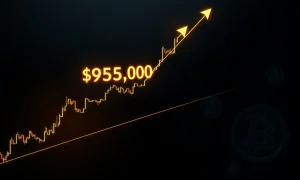The cryptocurrency market holds its breath as the Securities and Exchange Commission approaches a landmark decision on multiple Solana ETF applications. Within the next two weeks, regulators could greenlight innovative financial products that combine Solana exposure with staking rewards. This pivotal moment represents a potential turning point for institutional adoption of the high-speed blockchain network.
Solana ETF Applications Under SEC Review
Major financial institutions including Fidelity, Franklin Templeton, and Grayscale have submitted Solana ETF proposals to the SEC. These applications specifically incorporate staking functionality, allowing investors to earn yield while maintaining price exposure. The SEC’s decision window closes in mid-October, creating intense market anticipation.
Industry experts highlight the significance of this regulatory review. Nate Geraci, president of NovaDius Wealth Management, confirms the tight timeline. Meanwhile, the successful August launch of the REX-Osprey Solana staking ETF demonstrated strong investor demand. That product generated substantial trading volumes immediately upon listing.
Institutional Momentum for Solana ETF Products
Pantera Capital identifies Solana as the next major institutional opportunity following Bitcoin and Ethereum. However, current institutional holdings reveal substantial growth potential. Institutional investors control less than 1% of SOL’s total supply, compared to 16% for Bitcoin and 7% for Ethereum.
Key advantages driving Solana ETF interest:
- Transaction speeds exceeding 50,000 per second
- Staking yields between 7-8% annually
- Growing payment processor adoption including Stripe and PayPal
- Significantly lower transaction costs than competitors
Global Precedents Support Solana ETF Approval
European markets already demonstrate strong demand for Solana investment products. Bitwise’s Solana ETP with Staking attracted $60 million in inflows within just five days. This international success suggests substantial untapped appetite among U.S. investors.
Hunter Horsley, Bitwise Chief Investment Officer, notes that “Solana is on everyone’s mind” among institutional players. The network’s technical capabilities and developer activity continue attracting serious consideration from traditional finance institutions.
Potential Market Impact of Solana ETF Approval
SEC approval could trigger significant capital reallocation within cryptocurrency markets. Currently, Bitcoin dominates institutional holdings with approximately $364 billion, while Ethereum commands over $30 billion. Solana’s institutional holdings remain below $1 billion, indicating substantial room for growth.
Approval would provide several immediate benefits:
- Regulated access for conservative institutional investors
- Enhanced legitimacy for Solana within traditional finance
- Potential for staking-enhanced Ethereum ETF versions
- Increased liquidity and price discovery mechanisms
Regulatory Landscape and Timing Considerations
The SEC’s decision comes amid broader crypto regulatory developments. Recent approvals for other digital asset ETFs and potential generic listing standards create favorable conditions. However, the inclusion of staking functionality represents a novel regulatory challenge.
Market participants watch several key factors:
- SEC’s comfort with proof-of-stake mechanisms
- Precedent for income-generating crypto ETFs
- Political timing before November elections
- Coordination with banking regulators on custody issues
Frequently Asked Questions
What is a Solana ETF with staking?
A Solana ETF with staking allows investors to gain exposure to SOL price movements while earning additional yield through the network’s proof-of-stake mechanism. This combines capital appreciation potential with passive income generation.
Which companies have applied for Solana ETFs?
Major asset managers including Fidelity, Franklin Templeton, Grayscale, and VanEck have submitted Solana ETF applications. These firms manage trillions in traditional assets and bring significant credibility to the approval process.
When will the SEC decide on Solana ETFs?
The SEC must make decisions on several applications within the next two weeks, with mid-October representing the critical deadline. This timeline follows standard regulatory review periods for similar financial products.
How does Solana staking work in an ETF structure?
ETF issuers would stake a portion of the fund’s SOL holdings to validate transactions on the network. The resulting rewards get distributed to investors after deducting management fees, providing additional returns beyond price appreciation.
What percentage yield does Solana staking offer?
Current Solana staking yields range between 7-8% annually, significantly higher than Ethereum’s staking returns. This attractive yield profile helps drive institutional interest in staking-enhanced ETF structures.
How might Solana ETF approval affect SOL’s price?
Approval would likely increase institutional demand and improve liquidity. Historical precedent from Bitcoin and Ethereum ETF approvals suggests potential positive price impact, though market conditions remain influential.







